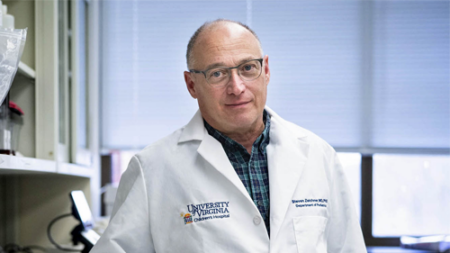
Steven Zeichner, MD, PhD
Steven L. Zeichner, MD, PhD, the McLemore Birdsong Professor in the Departments of Pediatrics and Microbiology, Immunology, and Cancer Biology and the Child Health Research Center and the Myles H. Thaler Center for AIDS and Human Retrovirus Research, was awarded a NIH R01 grant, “Globally Appropriate Genome Reduced Killed Whole Bacterial HIV Vaccines,” for more than $2.7 million.
The development of a safe and effective vaccine for HIV has been a long-sought goal that has remained frustratingly out of reach for more than three decades, but a safe and effective HIV vaccine would offer huge benefits, particularly for some of the poorest countries of the world – and underprivileged and marginalized populations in the developed world. The grant will support the development of new prophylactic HIV vaccines targeting two distinct regions of the HIV envelope protein, the fusion peptide and the membrane-proximal external region (MPER) using new insights from structural biology, high throughput immunology and a new vaccine platform being developed in Dr. Zeichner’s lab: killed whole cell genome-reduced bacteria that express vaccine antigens on the surfaces of bacteria using a bacterial protein called a Gram-negative autotransporter.
The lab had already been using the platform to develop universal coronavirus vaccines, working with collaborator XJ Meng, PhD, at Virginia Tech, and with the support of pilot funding from the UVA Comprehensive Cancer Center, in collaboration with Larry Lum, MD, to develop therapeutic cancer vaccines. The platform uses synthetic biology methods to rapidly produce, evaluate, and optimize many different possible vaccine candidates. These candidates are then tested in vitro, and in animal model systems for immunogenicity and the ability to elicit an effective immune response. The platform is specifically designed to yield vaccines that can be produced in existing factories around the world, which are already making conventional killed whole cell bacterial vaccines, using extremely low cost, readily available starting materials. The cost of the vaccines would be less than $1/dose, benchmarked against existing killed whole cell bacterial vaccines, which will both make the vaccines accessible to all people around the world, and dramatically decrease health care costs in the U.S.
Additional collaborators include members of the NIAID, NIH Vaccine Research Center, Peter Kwong, PhD, and Mario Roederer, PhD; and Mark Lewis, PhD, at Bioqual, Inc.
